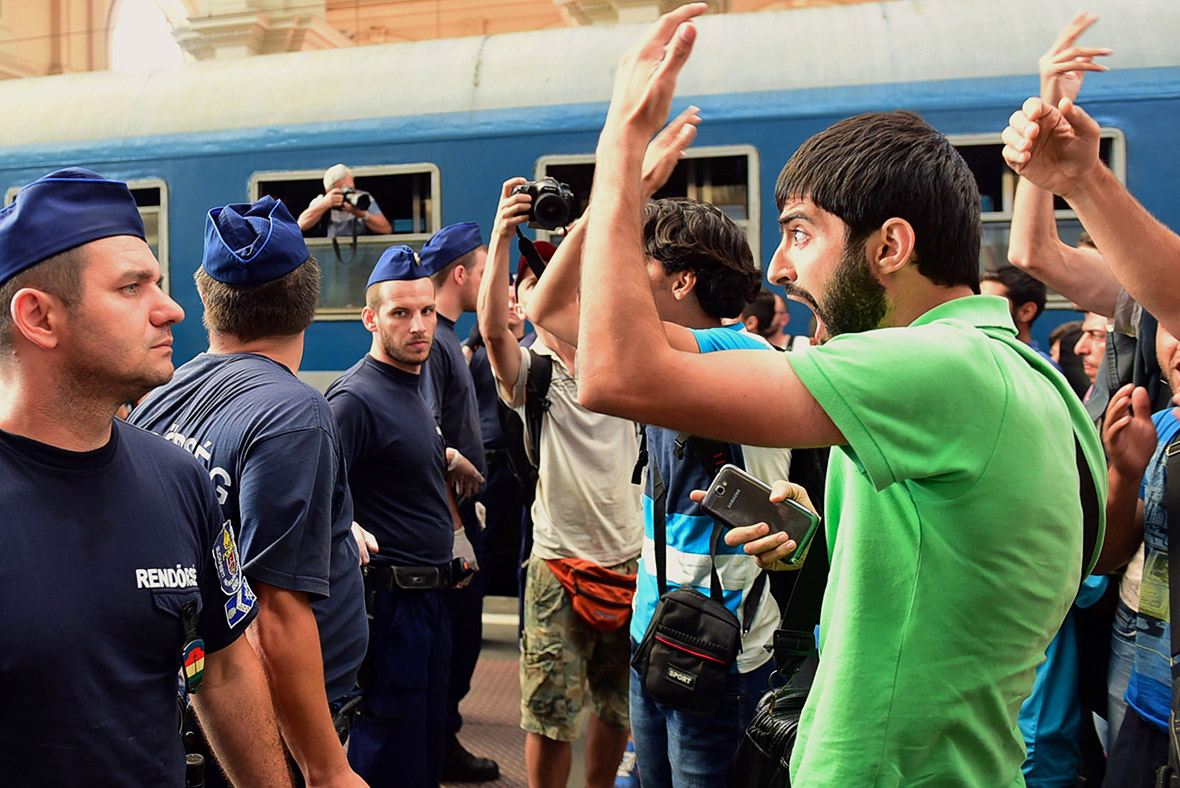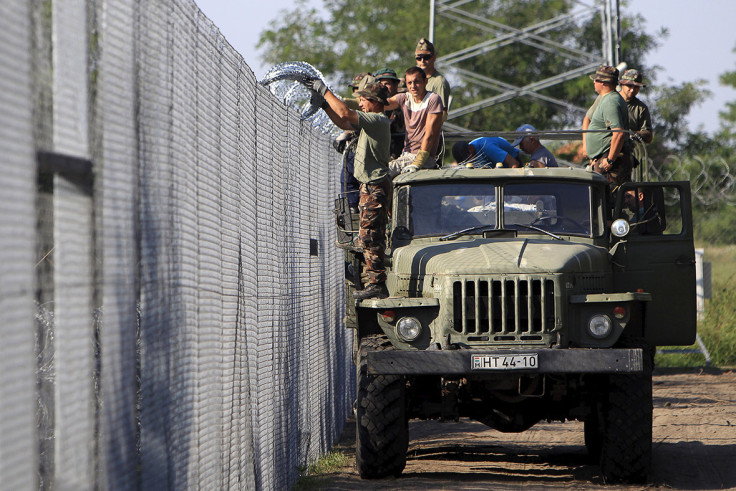EU migrant crisis: Angry refugees protest as Hungary bars them from main train station
Hundreds of angry refugees and migrants demonstrated outside Budapest's Eastern Railway Terminus, demanding that they be allowed to travel on to Austria and Germany. Hungarian authorities closed the train station altogether, then reopened it but barred entry to the refugees and migrants.


100 police operatives wearing helmets and wielding batons guarded the station. Around 1,000 people waved tickets, clapping, booing and hissing, and shouting "Germany! Germany!" outside the station.
Faced with the sheer number of people arriving in Budapest, Hungarian authorities had let them board westbound trains on Monday (31 August) before unexpectedly shutting the train station on Tuesday morning (1 September). Government spokesman Zoltan Kovacs said Hungary was trying to enforce EU law, which requires anyone who wishes to travel within Europe to hold a valid passport and a Schengen visa.




Hungary is on a major overland transit route from the Middle East and Africa for refugees fleeing violence and economic migrants escaping poverty, with more than 140,000 people crossing its southern border with Serbia this year alone.
Hungarian and Austrian authorities initially allowed several trainloads of undocumented migrants to reach Germany on Monday (31 August).







The crisis has prompted the government in Budapest to reinforce its border with a razor wire fence and deploy thousands of extra police to try to funnel the flow of migrants to legal channels rather than allowing them through unchecked.
Hungary's ruling centre-right Fidesz party, led by Prime Minister Viktor Orban, has struck a combative tone in the migrant crisis. Antal Rogan of the Fidesz party said "the very existence of Christian Europe" was under threat. "Would we like our grandchildren to grow up in a United European Caliphate?" Rogan told the pro-government daily newspaper Magyar Idok.

In Austria, thousands of supporters of the migrants chanted: "Refugees are welcome here" outside Vienna's main station. "These people need help, they have come from a horrendous situation, we should not think twice about helping them," said Ottwin Schober, a retiree who had been moved by the discovery of a truckload of 71 dead migrants in Austria last week.
Austrian authorities have stopped hundreds of refugees and arrested five traffickers along the highway from Hungary where the abandoned truck was found near the Hungarian border. Interior Ministry official Konrad Kogler denied that the clampdown violates the Schengen accord on free movement.



The influx is a crisis for the European Union, which has eliminated border controls between the 26 Schengen area states but requires asylum seekers to apply in the first EU country they reach. This rule is often ignored as people race towards the EU's more prosperous heart.
Khalil, 33, an English teacher from Kobani in Syria, told Reuters he had bought train tickets to Hamburg, where he felt sure of a better welcome after traipsing across the Balkans and Hungary. "Syrians call (Chancellor Angela) Merkel 'Mama Merkel'," he said, referring to the German leader's relatively compassionate response to the migrant crisis.






, whose country expects some 800,000 migrants this year, said the crisis could destroy the Schengen open borders agreement if other EU countries did not take a greater share. Britain, which is outside the Schengen zone, says the border-free system is part of the problem. A bloc of central European countries plan to oppose any binding quotas.
At Munich station in southern Germany, trains arrived from Hungary carrying several hundred people, mostly Syrian refugees. Men, women and children smiled with relief on reaching German soil. Police shepherded them from the platform to a station outbuilding to be registered. They were then taken to waiting buses outside, to be transferred to a reception centre in a former barracks in the north of the city.


Eighteen-year-old Mohammad al-Azaawi said he had abandoned his engineering degree and fled Syria after being wounded by a car bomb. He showed reporters scars on his stomach. His brother Ahmed told Reuters they had paid up to 3,000 euros (£2,200, $3,365) to make their way via Turkey, Greece, Madedonia, Serbia, Hungary and Austria. The family had had to sell their house to raise the money. "We escaped death in Syria. We want to stay here for a better future," he pleaded.
© Copyright IBTimes 2025. All rights reserved.






















